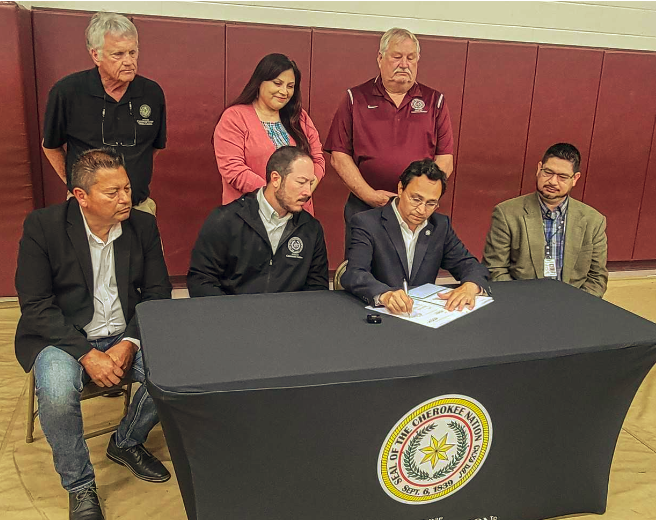
- Details
- By Chuck Hoskin Jr
Guest Opinion. Dark money corrupts. Democracy dies in the dark. But, the sovereign government of the Cherokee Nation Reservation is fighting back with recent election law reforms that demand transparency.
Let us start with the facts: Our longstanding election laws require transparency and accountability with respect to campaign donations. Donation limits, mandatory disclosure and prohibition against “independent expenditures” are all hedges against corruption embedded in Cherokee law. I believe our campaign finance laws were among the strongest in the country even before the latest reforms.
But, the 2019 election exposed some weaknesses in our laws. It is true that a candidate in 2019 was disqualified for illegally coordinating with an illegal entity operated by non-Indians out of Oklahoma City. Public hearings, including by our Supreme Court, disclosed this attempt to cheat and to steal an election by a group called “Cherokees for Change.” The law held one lawbreaker accountable. However, the law left many involved in the illegal scheme unscaur elections. Perhaps others are circling the Cherokee Nation with the same plans.
The Council of the Cherokee Nation recently took action after literally years of careful review of our election code. I proposed, and the council enacted, the country’s strongest ban on dark money. The law passed 15-0, with two councilors absent. Deputy Speaker Victoria Vazquez said she sponsored the legislation so that “people, not outside corporate interests, control our democracy.” She is spot on.
I proudly signed the reforms into law earlier this month alongside Deputy Chief Bryan Warner. The law reinforces the ban on the kind of anonymous and unlimited piles of cash that illegally poured into our 2019 elections from Oklahoma City. But, the law now punishes those who donate to these illegal entities with stiff criminal and civil penalties.
As Council Speaker Mike Shambaugh said, “The message we are sending today is that this is not 2019; you won’t get away with corruption.”
The ban on dark money is a true exercise of our tribal sovereignty and a win for government transparency. While other nations may be content with unlimited, unregulated, anonymous campaign contributions, the Cherokee Nation is not. Sixteen of 17 council members expressed support for this basic idea: The Cherokee people deserve to know who is contributing to candidates for public office.
The law did not hold accountable the people who funneled an unknown amount of money into the election. We may never know the full extent of the corruption, who made donations and what they hoped to gain from their scheme. Perhaps these same outside interests are regrouping to again try to buy oAs I reflect on our Nation’s bold stand against corruption, my thoughts turn to the current election campaigns in Oklahoma. Recently, I pushed back on politicians in Oklahoma who are claiming Cherokee sovereignty is “the greatest threat” and that our reservations should be “disestablished.” A number of powerful politicians seem to fear Cherokee Nation making its own laws and protecting the public interest.

From the perspective of anti-Indian politicians, maybe our sovereignty is a threat. It is certainly a threat to the corrupt influence of those who would try to secretly buy our elections.
I firmly believe that some of the same anti-Indian interests who want to destroy our reservat
We are sovereign. The Cherokee people demand transparency. The days of corrupt dark money in Cherokee politics are over.
Chuck Hoskin, Jr. is the principal chief of the Cherokee Nation.
More Stories Like This
Governor Stitt, it’s raining. Save SNAP.Remembering My Grandma During Native American Heritage Month
HHS Secretary Kennedy to Indian Country: Even During a Shutdown, Your Health Care is My Priority
Finding the Good News: MacKenzie Scott’s Quiet Commitment Amidst the Noise
Martial Law in an American City —1929
Help us tell the stories that could save Native languages and food traditions
At a critical moment for Indian Country, Native News Online is embarking on our most ambitious reporting project yet: "Cultivating Culture," a three-year investigation into two forces shaping Native community survival—food sovereignty and language revitalization.
The devastating impact of COVID-19 accelerated the loss of Native elders and with them, irreplaceable cultural knowledge. Yet across tribal communities, innovative leaders are fighting back, reclaiming traditional food systems and breathing new life into Native languages. These aren't just cultural preservation efforts—they're powerful pathways to community health, healing, and resilience.
Our dedicated reporting team will spend three years documenting these stories through on-the-ground reporting in 18 tribal communities, producing over 200 in-depth stories, 18 podcast episodes, and multimedia content that amplifies Indigenous voices. We'll show policymakers, funders, and allies how cultural restoration directly impacts physical and mental wellness while celebrating successful models of sovereignty and self-determination.
This isn't corporate media parachuting into Indian Country for a quick story. This is sustained, relationship-based journalism by Native reporters who understand these communities. It's "Warrior Journalism"—fearless reporting that serves the 5.5 million readers who depend on us for news that mainstream media often ignores.
We need your help right now. While we've secured partial funding, we're still $450,000 short of our three-year budget. Our immediate goal is $25,000 this month to keep this critical work moving forward—funding reporter salaries, travel to remote communities, photography, and the deep reporting these stories deserve.
Every dollar directly supports Indigenous journalists telling Indigenous stories. Whether it's $5 or $50, your contribution ensures these vital narratives of resilience, innovation, and hope don't disappear into silence.
 The stakes couldn't be higher. Native languages are being lost at an alarming rate. Food insecurity plagues many tribal communities. But solutions are emerging, and these stories need to be told.
The stakes couldn't be higher. Native languages are being lost at an alarming rate. Food insecurity plagues many tribal communities. But solutions are emerging, and these stories need to be told.
Support independent Native journalism. Fund the stories that matter.
Levi Rickert (Potawatomi), Editor & Publisher
